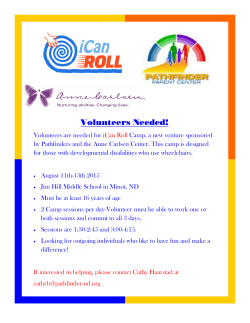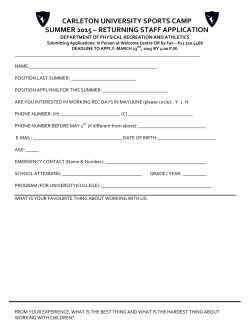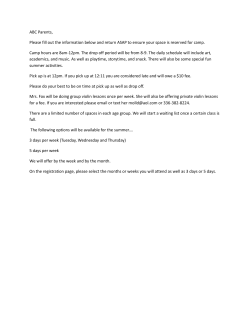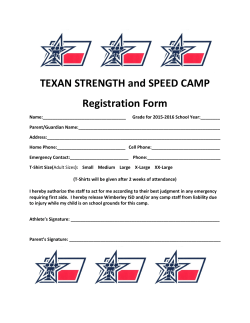
DE-SCI-10.56 Lützensömmern 01.08.2015 - 23.08.2015
Infosheet for DE-SCI-10.56 Carpe Diem - Seize the day (Lützensömmern), 01.08.-23.08.2015 SCI-branch co-ordinating your workcamp: Service Civil International - Deutscher Zweig (SCI-Germany) Address: Blücherstr. 14 | D - 53 115 Bonn | Germany Tel.: +49- (0) 228 - 21 20 86 Fax: +49- (0) 228 - 26 42 34 E-Mail: incoming@sci-d.de Web: www.sci-d.de You have been accepted for the workcamp: DE-SCI-10.56 Lützensömmern Begin and end of your workcamp: 01.08.2015 - 23.08.2015 Dear volunteer, now you hold the long expected infosheet for your workcamp in your hands. Please read it carefully and give special attention to what to bring along, insurance guidelines and what we expect from volunteers. Your personal attitude counts! Despite all the information we give you here, it is important that you are flexible and act in a friendly and responsible way to the group and the project. In a workcamp it is possible that things do not go according to the original plan or to your expectations. It can happen that things are organised differently than described in the Info sheet. As most of our workcamps take place in non-profit organisations (who also work with volunteers), please be open-minded and prepared for changes! In 2014 SCI organises a global campaign about climate change and climate justice. The campaign is called “Create a climate for peace!” More information is available on the website of SCI international: www.sciint.org/climate-justicecampaign SCI Germany is part of the campaign – with several climate campaign camps and with workshops in all our workcamps about climate change and climate justice. You are invited to contribute to the campaign and bring in your own ideas and experience! Below you will find a specific description of your camp (part 1) as well as general information about SCI and workcamps (part 2). We wish you great experiences and wonderful people to meet. Your SCI-Germany team Project address: Tagungshaus Rittergut e.V. Rittergut 99 99955 Lützensömmern www.rittergut.de Contact person in the project: Mr. John Tel: (+49)36041 / 330333 Email: john@rittergut.de Camp address (where the workcamp is accommodated): Tagungshaus Rittergut e.V. Rittergut 99 99955 Lützensömmern Tel: (+49) 36041/ 41914 or / 330333 Other remarks: German – Italian Workcamps with international volunteers. Please let the local project know when you arrive at the train station in Gangloffsömmern! Send an email to john@rittergut.de! Number of volunteers: Camp language: 15 English page 1 of 7 Infosheet for DE-SCI-10.56 Carpe Diem - Seize the day (Lützensömmern), 01.08.-23.08.2015 1 SPECIFIC INFORMATION ON YOUR WORKCAMP 1.1 Which project will you support? The „Rittergut“, a once agricultural estate is now an educational and meeting place and it is located near the state capital Erfurt. In the little, quaint village of Lützensömmern the „Rittergut“ takes with his historical buildings and the big park a dominant place. With approximately 18.000 accommodation in one year the estate is an famous far outside location. This location provides children- and youth in the context of school trips and project days a lot of space for their personal development and non-formal education. People from all over Germany and Europe use the house with his extraordinary beautiful ambiance as a meeting place for seminars, workshops and family events. Not only for the small and the big visitors of the estate, also for the employee and volunteers of the house, it should means: "Carpe Diem - use the day". 1.2 What work will you do? The over 4 acres large land needs in many areas constant care, renewal and not least the expansion of the experiential and environmental education offers. The participants of the workcamp will build up the fence around the park area. 1.3 What topics are planned for the “study part”? When you read “study part”, do not think of dry learning sessions like at school! We rather think of “learning opportunities” that you will be offered during your workcamp. You will get to know more about the aims of your project, you will have group discussions about topics which are connected to your workcamp: Ecological reconstruction of the manor; the ecological situation of the region; social and economic changes due to demographic trends 1.4 Which group activities are planned for your free time? The Rittergut is located in a small Thuringian village 30 km away from Erfurt in restorative environment. On the area of the Rittergut and in the region there are places where you can play volleyball and football or you can go swimming with the children of the camp. We will have some excursions (Erfurt, Weimar, Buchenwald, natural reserve “Hainichland”). You should be aware that we need to share the travel costs for the excursions. The project is situated in a small village, the nearest places to visit a city or to go shopping are not “around the corner”. The Rittergut will arrange a charabanc ride for the group of participants (if the weather is ok). It would be useful to bring your bike or car (if possible). 1.5 Where will the group stay and who takes care of the meals? In comfortable tents in the beautiful gardens of the estate between trees and flowers (please bring your own mat and sleeping bag!); the showers in the house can be used. The volunteers can use the kitchen including facilities and possibilities. The food will be provided. There is also a fireplace and a small nice zoo. Internet access: 1.6 no yes What should you bring along? Your health insurance card (IMPORTANT: please also read chapter 1.9) Sleeping bag (Please bring a warm sleeping bag, as it could be really cold and rainy even in summer) Warm clothes, as it could be really cold and rainy even in summer Clothes for leisure time page 2 of 7 Infosheet for DE-SCI-10.56 Carpe Diem - Seize the day (Lützensömmern), 01.08.-23.08.2015 Working shoes (robust shoes which give you enough stability for work, e.g. hiking shoes) Raincoat Swimsuit Games or creative ideas for the leisure time Music (your favourite CDs, if you play an instrument, feel free to bring it along) Your student ID for discounts (if you have one) If you like, some characteristic food from your country or region Recipes and spices for preparing a national specialty when you are here Enthusiasm and interest for the project and the group 1.7 When should you arrive to the workcamp? Please be aware that the camp dates are fixed! We expect you not to arrive at or to leave the camp earlier or later than at the given dates (see page 1). Arrival time is on the first day of the camp between 1 and 8 pm (13.00h and 20.00h). In case you cannot come on time or you have to cancel your participation, PLEASE INFORM US immediately. This is very important as we need to inform the project partner and the camp coordinators. INFORMATION FOR VOLUNTEERS WHO NEED VISA: If not yet, you will receive an official invitation from SCI Germany. The dates on your official invitation from SCI Germany are - on purpose – slightly different from the real camp dates. We want to give you some more flexibility to arrive in the camp on time. But as said before, please keep in mind that it is NOT possible to arrive earlier or stay longer in the project. 1.8 How do you get to the workcamp? By train: From Erfurt Main Station take a train (direction Nordhausen) and get off at “Gangloffsömmern”. Because of this very small station, you should make itself felt before arrival, otherwise the train don´t stop maybe. From there we will pick you up, so please call us or send an email in advance to let us know when you arrive! For train connections within Germany check the website of German Railways (Deutsche Bahn AG): www.bahn.de. On this website you can search in many different languages. If you click on “Further search options”, you will also find the option to enter the address of your destination. If you do an advanced search, you will not only find out the train connection to the last train station, but also how to continue further from the station to your camp address (with local buses, trams or on foot with a detailed map). By bus: Within Europe, there are many cheap bus connections to Germany (Eurolines, Eurobus etc.). Try this website: http://www.eurolines.de/en/home/ (in English) You have also the possibility to book busses instead of trains for long distance travels in Germany. The prices are mostly less than for train connections. Here is a search option for long distance busses within Germany (unfortunately only in German): http://www.busliniensuche.de/ By plane: Next big airports are in Berlin and Frankfurt. From the Airport take the train to Erfurt. From Erfurt Main Station take a train (direction Nordhausen) and get off at “Gangloffsömmern”. From there we will pick you up, so please call us or send an email in advance to let us know when you arrive! page 3 of 7 Infosheet for DE-SCI-10.56 Carpe Diem - Seize the day (Lützensömmern), 01.08.-23.08.2015 You can also check the list and map of German airports in Wikipedia. Destinations and airlines for any of them can be found on appropriate page. Or you can also check the list of closest airports and their destinations using the service http://www.travelmath.com/nearest-airport/ Please consider: The cheapest way to get to a place may not be the best for our environment and climate! Try to avoid using an aeroplane because planes produce far more carbon dioxide (CO2) than any other form of public transport. 1.9 What do you need to know about insurance? SCI insurance is supplementary to your private insurance and covers special cases only. You can find all relevant information and forms on SCI-Insurance here: www.sci-d.de/insurance Before you take part in the camp, YOU have to make sure that you have sufficient insurance coverage. Therefore we recommend that you contact your insurance company for information make sure that you take appropriate documents of your insurance with you to the camp. arrange for a personal international health insurance. In case of illness or accident the volunteer's private insurance or that of his/her parents is liable. Look through the guidelines before you take part in the camp. All documents on SCI-Insurance, which you find on our website, are written in English. EU citizens should bring their health card. If you don’t have this card, you should ask your insurance company to give you a temporary equivalent form instead. Citizens of those countries that have a social insurance agreement with Germany should bring the verification form. All volunteers should be aware that • dental treatments are NOT covered by the SCI insurance scheme unless the necessity of dental treatment is caused by an accident during the workcamp. If you don’t want to risk high costs that you have to cover yourself, please make sure that you arrange your own insurance for dental treatments. • SCI-Insurance does NOT cover costs for illness or accidents arising from special physical or mental conditions (e.g. epilepsy, physical handicap, chronic illness) existing before to the period of insurance. People who fall in this category should seek advice on alternative insurance arrangements. If you have any doubts or questions on SCI-Insurance, please contact your sending organisation. It is important to clarify uncertainties before departure. 2 GENERAL INFORMATION 2.1 What is SCI? Service Civil International (SCI) is a voluntary peace organisation with approx. 43 national branches and groups worldwide. SCI aims are promoting peace, international understanding and solidarity, social justice, sustainable development, and respect for the environment. SCI believes that all people are capable of living together with mutual respect and to solve conflicts without recourse to any form of violence. The roots of Service Civil International go back to the end of World War I when Europe had to be reconstructed and the people needed to co-operate again in a peaceful way. The first international workcamp was organised in 1920 by Swiss pacifist Pierre Ceresole and his friends in the village Esnes close to Verdun, France. Verdun is a town close to the German border and was completely destroyed during the war. It stands for horror and death of wars in general. page 4 of 7 Infosheet for DE-SCI-10.56 Carpe Diem - Seize the day (Lützensömmern), 01.08.-23.08.2015 Even though the first experience was not easy, the idea spread quickly. The volunteers from this camp wanted to inspire others to work for peace as an alternative to military service. The number of volunteers rose quickly and they started to call their network “Service Civil International”. Some historical pictures of early SCI-workcamps Nowadays the work of SCI is carried out on all the continents and ranges from reconstruction work to ecology, from social inclusion to North-South solidarity. Every year hundreds of people get inspired by the simple but powerful idea, which started the first workcamp. Would you like to know more about the history, aims, structure and network of SCI? Here are two links, where you can find a lot of interesting information: www.sciint.org (Website of SCI International in Antwerp, Belgium) www.service-civil-international.org (Website of SCI International Archives in La Chaux-de-Fonds, Switzerland) 2.2 SCI Germany The German branch of SCI was officially registered in 1947 and is an approved independent non-profit organisation. SCI Germany organises around 50 workcamps every year. Some pictures of SCI-workcamps today With our workcamps we want to: support non-profit organisations, small initiatives and socially disadvantaged groups, raise awareness about the necessity of the preservation of natural resources, draw public attention to social, political and ecological problems, promote understanding and solidarity between people from different backgrounds, learn from history, remember Germany’s past, promote reconciliation and fight against racism, support peace and general disarmament, give you the opportunity to meet great people and to do something useful. We want to remind all volunteers that SCI is NOT an alternative travel agency and that we expect a high level of motivation, co-operation and open-mindedness from each volunteer! 2.3 What can you expect from a workcamp? Unless stated differently in the camp description: Volunteers shall work 5-6 hours per day, the weekends are free to do activities within the group, camps are co-ordinated by either one or two camp coordinators. page 5 of 7 Infosheet for DE-SCI-10.56 Carpe Diem - Seize the day (Lützensömmern), 01.08.-23.08.2015 Our workcamps are totally based on self-organisation. Self-organisation is a process where volunteers and camp coordinators create together a structure for their daily camp-life. There is no central authority to make decisions for the group. The camp coordinators shall only support this process. All participants decide and act together in a responsible way, so that everybody can enjoy the workcamp. DO NOT EXPECT that the camp coordinators will organise events and excursions for the group. All our workcamps are run according to the principles of: communal living, group decision making, equal participation and collective problem solving. The quality of the workcamp depends very much on YOUR INPUT, YOUR IDEAS and YOUR INITIATIVE. 2.4 What do we expect from you as a workcamp participant? That That That That That That That 2.5 you you you you you you you show a willingness to work and to learn more about the specific topic of your workcamp. participate in the workcamp from its very first till the very last day. participate in daily tasks (cooking, cleaning, setting the table, etc.). help to share responsibility by making suggestions for group activities, discussions, games etc. commit to a group experience and help making decisions and solving problems. respect the people in the hosting project. make an effort to live in an eco-friendly way. How can you live in an environment-friendly way? How can we live in a way that also future generations will be able to live a happy life on our planet? This is an important question to SCI-Germany. Therefore, we like to encourage all our volunteers to reflect their own life styles and daily habits. We believe that we are all responsible for the condition of our planet and each of us has options. Please choose for a sustainable way of living. General information in English and German on how to live eco-friendly you can find here Some practical ideas for your workcamp: • Reduce garbage in everyday life and separate garbage for recycling: Choose fresh food and food/drinks which are sold with very little (or recyclable) packaging instead of food which is wrapped in a lot of plastic packaging. Prepare meals which can also be eaten the next day (avoid throwing food away). Separate the garbage into organic, paper, plastic and glass so that it can be re-used or recycled. • Avoid CO2 (=carbon-dioxide, one of the major greenhouse gases responsible for climate change) Buy fruits and vegetables from the local region instead of far-away countries which were transported over long distances. Choose food which is “eco-friendly” instead of food which is produced with a lot of chemistry. Eat a tasty variety of vegetarian meals rather than consuming a lot of meat. The way animals are raised in a highly industrial and globalised world is not only very cruel but has also many negative effects on our environment and climate. If volunteers feel they need to eat meat, we recommend buying from a local butcher rather than from a big discount supermarket. • Save energy/electricity: Switch off the lights when leaving a room. Turn off electric devices (laptop, cd-player, etc.) when you don’t use them – and make sure they are really off, and not just in stand-by mode (this consumes a lot of energy, too!) • Save water: - Don’t leave the tap running. - Use only as much water as you really need (If you don’t have enough clothes to fill the washing machine, ask others if they also need to wash theirs. If possible, take only one shower a day). Your ideas for the conservation of natural resources are very welcome! page 6 of 7 Infosheet for DE-SCI-5.19 Ahrensburg (08.-20.07.2014) 2.6 Where can you find more information about travelling in Germany? Some useful links to basic information about Germany: The Deutschland-Portal: National Tourist Board: “Lonely Planet”: 2.7 www.deutschland.de http://www.germany-tourism.de http://www.lonelyplanet.com/germany Basic German Vocabulary for International Participants English phrase Translation in German Hello! Good morning! / Good afternoon! / Good night! Bye, bye! See you again! Hallo! Guten Morgen! / Guten Tag! / Gute Nacht! Tschüss! Auf Wiedersehen! My name is… What’s your name? Where do you come from? I am from… Ich heiße… Wie heißt du? Aus welchem Land kommst du? Ich bin aus... I don´t understand. I don´t speak German. Do you speak English? Ich verstehe nicht. Ich spreche kein Deutsch. Sprechen Sie Englisch? (polite for people you don´t know) / Sprichst du Englisch? (informal) How are you? Good / Bad / Everything is okay Thanks! / Please. Yes / No Perhaps Wie geht es dir? Gut / Schlecht / Alles in Ordnung Danke! / Bitte. Ja / Nein Vielleicht What time is it now? Excuse me, could you help me please? How can I help (you)? Where can I find…? station (main station) shop / supermarket/ doctor… I am hungry / thirsty. I would like (to have)… Coffee / tea / water / milk / bread / butter … Enjoy your meal! I have pain …! Wie spät ist es? Entschuldigung, können Sie mir bitte helfen? Wie kann ich helfen? Wo kann ich ... finden? Bahnhof (Hauptbahnhof) Geschäft / Supermarkt / Arzt ... Ich habe Hunger / Durst. Ich hätte gerne... Kaffee / Tee / Wasser / Milch / Brot / Butter /... Guten Appetit! Ich habe Schmerzen...! P.S.: The German letter “ß” is pronounced like a sharp “ss” (like in kiss) page 7 of 7
© Copyright 2025









